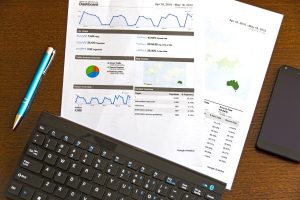Data ownership: who’s data is it?
 When you purchase a software, you don’t actually own the software, but a license to use it.
When you purchase a software, you don’t actually own the software, but a license to use it.
The software, the code and all the add-ins are all owned by the vendor. You have no right on it, except the right to use it as long as you pay the annual license (if there’s one).
But you do own the data!
Whether it’s a complete ERP, a simple software or an online software, the data should always be yours.
Let me be clear. The database system itself is owned by the vendor – or its respective owner – but the information inside is the customer’s property.
Data ownership – Why is it important?
For four simple reasons:
- There is confidential business information is your data
- Data can be worth a lot of money (see the value of Facebook is you’re not sure)
- Data analysis can help grow your business
- If you change your systems, you’ll want that data to be transferred to ensure continuity
Vendors don’t like to see you play with the database
Even if the data is yours, you should never modify data directly in the database. Extraction is ok, but not modification.
Vendors hate when people play in their database. They always prefer the users to go through the user interface they built. This way, they make sure that there will be no data corruption in the system.
And they are right! Don’t allow anyone that is not a specialist to play directly with your data.
Data ownership – the data is yours
What vendors generally don’t emphasize enough is that the data is yours. They have no right over it and you can do whatever you wish with it (extract it, reporting, etc.).
You have the right to access the database, even if the vendor says if it is password protected. The only thing a vendor could forbid is for you to write directly in the database. But, even then, you should be able to do it at your own risks.
In the case of cloud computing, you should make sure before you start using the software that the supplier will provide your data whenever you’ll need it. Since the data is located on their server, it may be harder to get your hands on your data if you ever need it.
What the contract should stipulate
Before buying a software, make sure the contract stipulates that:
- The data is yours
- Make sure the vendor will allow a direct connection to the database (for business intelligence and to interconnect systems)
- In the case of a cloud provider, the vendor should provide data
upon request (they may request a fee)
Data ownership – How to use your data?
The data in your system has much more value than you think. And the more you have, the more interesting it gets.
Build new reports
Help users be more effective by building new reports they need. Most business systems will provide tools for users to build their own reports. For more complex reporting, it may be necessary to use external tools or to ask the vendor to develop them.
Connect your systems together
By creating bridges between your systems, you connect and synchronize their respective data. It requires some investment, but there is a lot of benefits:
- Better user experience
- Improved data management
- Integrated security
Cross-analysis – Make your data talk
When you’ve been using your systems for quite some time and have accumulated a lot of information, it is a good idea to build analytical reports
Business intelligence is still reserved for larger enterprises since it requires specialized resources and software, but even a free database software can help smaller businesses analyze their historical data.
Data ownership – Final note
When buying a new business software, make sure the contract stipulates you have all the rights over the data and that the database will be accessible whenever needed.
Especially be careful when using a software in the cloud. Since the database is not physically in your offices, claiming the rights over it can be tougher and be pricier.
As you can see, your systems’ data can hold unexploited value. Make sure you use it well, but more importantly, make sure that it is legally yours and easily accessible.
Related articles
Home > Data Management Plan > Data Ownership
